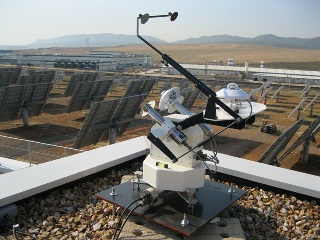A weather station is a system integrated with a sensor or measuring devices of different types with the goal of measuring the time variability of the weather conditions from a specific site through a discrete sampling of physical variables, called observations.
Currently, the Instituto de Sistemas Fotovoltaicos Concentration (ISFOC), owns a network of automatic-measuring weather stations, operative 24 hours a day, 365 days a year. ISFOC automatic weather stations are designed to measure and characterise the solar radiation, ranging from all its components, from global to direct and diffuse, although they focus on the energy coming directly from the solar disc, the Direct Solar Radiation (DNI), the one feeding the CPV technology. This measuring network's main goal is to support the research activity of our Institute, in the common field of the Meteorology and Concentration Photovoltaic Technology (CPV). ISFOC’s automatic weather stations are in compliance with the Spanish R&D General Plan targets for Solar Concentration Photovoltaics, issued by the same Institute in 2008 in regard with the Castilla-La Mancha region’s needs. Those are listed below:
- Knowing and quantifying the solar resource of Castilla-La Mancha, by analysing its spatial and temporal complexity.
- Developing methodologies for the short-term prediction of solar resources (hourly and daily).
- Contributing to the improvement of the Spanish national network of measuring stations for solar radiation by creating an integrated database of solar radiation observations and ranging from all its components (global, direct, and diffuse) as well as the solar spectrum measures, with this element being very important for understanding and improving the high-efficiency cells' performance (>40%)
ISFOC’s automatic measuring network is made up of four weather stations installed next to the ISFOC CPV plants in Castile-La Mancha (Spain).
|
|





